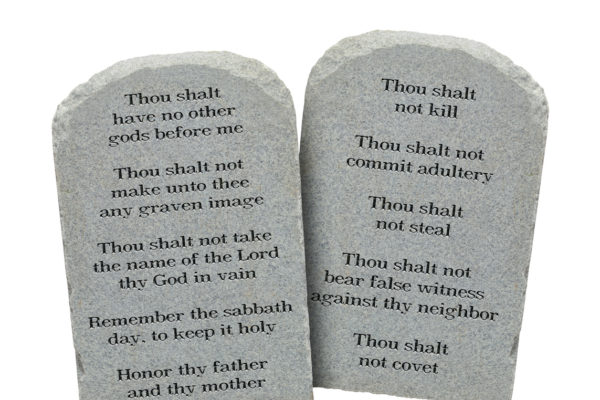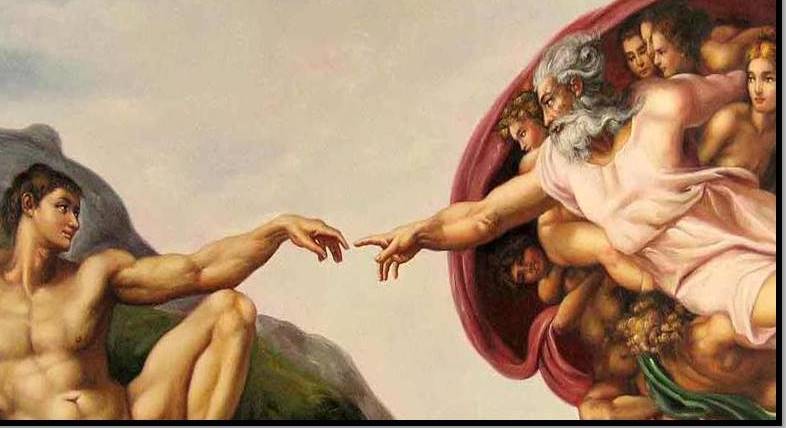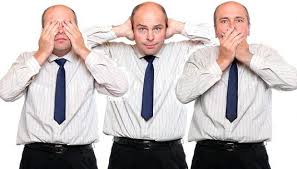 Louisiana is now the first state in the U.S. to require the Ten Commandments to be posted in all school classrooms. The news has left me with questions and a gnawing sense of foreboding. The foreboding arises from what seems to be the misappropriation of faith in the public sphere for the singular goal of acquiring legislative power. Said differently, faith is being used as a club, a deterrent of difference. I think faith (one’s assumptions about reality) should be an implicit part of the public sphere – we all have starting points, assumptions that frame reality for us that need the challenge of different perspectives if we discuss maintaining a civil society.
Louisiana is now the first state in the U.S. to require the Ten Commandments to be posted in all school classrooms. The news has left me with questions and a gnawing sense of foreboding. The foreboding arises from what seems to be the misappropriation of faith in the public sphere for the singular goal of acquiring legislative power. Said differently, faith is being used as a club, a deterrent of difference. I think faith (one’s assumptions about reality) should be an implicit part of the public sphere – we all have starting points, assumptions that frame reality for us that need the challenge of different perspectives if we discuss maintaining a civil society.
While the text of HB71 in Louisiana is careful to guard against partisan language in the guise of educational outcomes, the interviews conducted with those who supported the bill reveal the more troublesome misappropriation of faith I mentioned above. In this blog, I attempt to isolate the source of my foreboding and explain why I think any legislature’s attempts to promote a worldview exclusively are dangerous to any form of civil discourse other than a dictatorship. I have questions.
- What is the intention of the Louisiana legislature?
- How will the stated educational intention be measured for outcomes?
- Is there a stated social agenda in adopting the Ten Commandments as a classroom tool?
- Does posting behavioral guidelines help change classroom behavior?
- Does HB71 address a measurable educational outcome or serve as a behavioral guideline for classroom behavior?
What is the intention of the Louisiana legislature?
“The Legislature intends to apply the decision set forth by the Supreme Court of the United States in Van Orden v. Perry,” the Louisiana law reads, “to continue the tradition and ensure that the students in our public schools may understand and appreciate the foundational documents of our state and national government.”[i] (Emphasis mine.)
For those unfamiliar, the U.S. Supreme Court’s landmark 5-4 ruling in Van Orden v. Perry declared that a Ten Commandments monument outside the Texas state capitol building, while having religious content, was not violating the Establishment Clause. This ruling is the basis for the Louisiana legislature’s decision.
When I read the Legislature’s intent, I interpret the words “understand” and “appreciate” considering Bloom’s taxonomy. In 1956, Benjamin Bloom, with collaborators Max Englehart, Edward Furst, Walter Hill, and David Krathwohl, published a framework for categorizing educational goals: the Taxonomy of Educational Objectives. Familiarly known as Bloom’s Taxonomy, this framework is used by K-12 teachers and college instructors in their teaching. It comprises six major categories: Knowledge, Comprehension, Application, Analysis, Synthesis, and Evaluation. The categories after Knowledge were presented as “skills and abilities,” with the understanding that knowledge was the necessary precondition for putting these skills and abilities into practice.[ii]
I think the outcomes described in HB71 are appropriate. However, I question the genuineness of the intention, hence my unease with the bill. I expect a true learning outcome to be measurable, but HB71 fails in this regard, and further commentary by those who wrote the bill betrays a different agenda.
How will the stated educational intention be measured for outcomes?
HB71 has no mechanism for measuring its stated purpose. It places a document in a classroom without expecting additional action to follow its posting. This is evident not only in the text of the bill itself but also in the defense of the bill against critics, in which Louisiana legislators insist that students will not be forced to read the document. Essentially, HB71 dictates posting a document for no apparent measurable purpose other than to take up wall space. So why go through the motions to write this legislation in the first place?
Is there a stated social agenda in adopting the Ten Commandments as a classroom tool?
A clue to one alternative agenda of HB71 is stated by Dodie Horton, the state representative who sponsored the Louisiana bill, who said that having the commandments posted would allow students to “look up and see what God says is right and what he says is wrong.[iii] Horton infers that one use of the Ten Commandments in the classroom is to offer behavioral guidelines students may routinely refer to.
HB71 does not specifically address the idea of behavioral guidelines for the classroom. However, the indirect implication is part of the law’s explanation when it states, “Recognizing the historical role of the Ten Commandments accords with our nation’s history and faithfully reflects the understanding of the founders of our nation with respect to the necessity of civic morality to a functional self-government. History records that James Madison, the fourth President of the United States of America, stated that “(w)e have staked the whole future of our new nation . . . upon the capacity of each of ourselves to govern ourselves according to the moral principles of the Ten Commandments.”[iv]
But, here, I oppose the Ten Commandments serving as a behavioral guideline. Why? Classroom rules play a significant role in classroom management. They set clear expectations for behavior and provide a framework for the daily operations of the class. This structure fosters a sense of safety and stability, allowing students to focus on learning rather than navigating social uncertainties. Classroom rules contribute significantly to a productive learning environment. They help minimize disruptive behaviors and encourage desired behaviors, contributing to a positive atmosphere beneficial to learning. Rules provide students with clear guidelines on what is acceptable and what is not, fostering mutual respect and cooperation among students and teachers.
The Ten Commandments fail this task in a pluralistic society. Given that they were to guide Israel in their covenant relationship with God, they met all the criteria of good behavioral guidelines because of the monism of Israel. Christians adopted the Ten Commandments as a foundation for their thinking personally and politically, as HB71 points out. But we don’t live in a wholly Christian society or monotheistic society.
The Religious Landscape Study by Pew Research, conducted in 2007 and 2014, surveyed more than 35,000 Americans from all 50 states about their religious affiliations, beliefs and practices, and social and political views. At that time, Jewish, Hindu, Muslim, Buddhist, and other religions comprised roughly 6% of the population, while unaffiliated, e.g., Atheist, Agnostic, or Nothing in Particular, comprised nearly 23% of the population.[v] So, the Ten Commandments fail to provide a sense of social safety and mutual respect. The Ten Commandments are exclusive and apply to the one God of Israel and Christianity.
Consider for a moment what it takes to use behavioral guidelines effectively in the classroom. Then consider the compounding negative impact the Ten Commandments might have on a student who is not from a Christian or Jewish family.
Does posting behavioral guidelines help change classroom behavior?
PublicSchoolWORKS, a provider of K-12 staff and student safety compliance programs, offers the following guidelines for implementing effective classroom rules.[vi]
- Post Classroom Rules Prominently: Display the rules prominently in the classroom, making them easy to find and remember. Put them up on the wall or use visuals like charts, posters, or videos to reinforce the message.
- Review the Rules Regularly: Review the rules with the class to ensure they know and understand them. This can be done through class discussions or role-play activities.
- Model the Rules: Model the desired behavior to show students how the rules should be followed. This helps create a positive learning environment and reinforces the importance of following the rules.
- Provide Positive Reinforcement: Reward good behavior with positive reinforcement. This could be verbal praise, stickers, or small rewards, which can help to motivate students to follow the rules.
HB71 provides only one of the four guidelines mentioned above. No review, no modeling, and no positive reinforcement guidelines are provided. Modeling the rules may be a sticking point regarding the Ten Commandments. Among the many questions that come to mind, the first is whether we are to interpret the Ten Commandments from the lens of Christianity or Judaism (my apologies to my Jewish friends for dragging you into this conflict). It is impossible to go past the first of the ten without nailing down the question since the Christian claim that Jesus is God ends up failing the test of Commandment One from a strictly Jewish perspective. And what about my atheist friends? They also have input into the interpretive grid from which these commandments are interpreted.
Does HB71 address a measurable educational outcome or serve as a behavioral guideline for classroom behavior?
It should be clear by now that HB71 fails as an educational tool. So why codify the Ten Commandments into State Law?
The horrifying reality is that some Evangelicals seem to insist on building a theocratic society with themselves in power. For anyone who follows the news of Evangelical moral lapses, Evangelicals should use the Ten Commandments as a tool of personal and collective confession and repentance – not governance.
HB71’s failure to outline how it measures its intended outcome suggests that the law’s passage is more theatrics geared to the so-called culture wars than education. This is the root of my foreboding. In a crazed political environment, I (ironically, it may sound) hold to the foundation of the Ten Commandments. I am committed to not taking the name of God in vain. This doesn’t mean I loathe swearing, which is how it is popularly treated. The idea has much more to do with how we carry ourselves as representatives of God. It is a warning about putting God’s name and approval on anything violent and harmful to our fellow creatures, such as claiming God’s approval for war, injustice, dehumanization, or the desecration of creation.[vii]
Ultimately, I lament the Ten Commandments’ use as political fodder rather than their intended use of affirming fidelity to a covenant relationship with the God of Abraham, Isaac, Jacob, and Ray.
[i] Source: https://religionunplugged.com/news/2024/6/21/louisiana-mandates-ten-commandments-be-displayed-in-all-public-schools; Accessed 24 June 2024.
[ii] Source: https://cft.vanderbilt.edu/guides-sub-pages/blooms-taxonomy/; Accessed 24 June 2024.
[iii] Source: https://www.nytimes.com/2024/06/21/us/louisiana-ten-commandments-landry.html; Accessed 24 June 2024.
[iv] Source: https://legis.la.gov/legis/ViewDocument.aspx?d=1382697; Accessed 24 June 2024.
[v] Source: https://www.pewresearch.org/religious-landscape-study/database/; Accessed 22 June 2024.
[vi] Source: https://corp.publicschoolworks.com/resource/classroom-rules-importance-and-tips-for-creating-and-enforcing-them/; Accessed 22 June 2024.
[vii] Source: https://uscatholic.org/articles/202309/what-does-it-mean-to-take-gods-name-in-vain/; Accessed 24 June 2024.


 What differentiates the United States from every other nation? I was taught American exceptionalism, the idea that the United States of America is a unique and even morally superior country for historical, ideological, and religious reasons. Proponents of American exceptionalism generally pair the belief with the claim that the United States is obligated to play a special role in global politics.
What differentiates the United States from every other nation? I was taught American exceptionalism, the idea that the United States of America is a unique and even morally superior country for historical, ideological, and religious reasons. Proponents of American exceptionalism generally pair the belief with the claim that the United States is obligated to play a special role in global politics. I awoke this morning to discover that my Facebook account had been permanently disabled. Apparently, in the night, a hacker first tried to reproduce my site and then did something to have my account permanently disabled.
I awoke this morning to discover that my Facebook account had been permanently disabled. Apparently, in the night, a hacker first tried to reproduce my site and then did something to have my account permanently disabled.
 During the 2024 Presidential election campaign season, an acquaintance asked me what my problem was with Mr. Trump. I explained that my difficulty wasn’t with Mr. Trump, I could vote for someone else, my difficulty was with Evangelical leaders’ unqualified support of Mr. Trump’s candidacy for the presidency. I explained that what I found surprising in the support offered by the Evangelical world for Mr. Trump was a distinct lack of coaching in the faith they said he professed in Jesus as Lord. The President’s rhetoric and some of his values stand in opposition to faith in Christ.
During the 2024 Presidential election campaign season, an acquaintance asked me what my problem was with Mr. Trump. I explained that my difficulty wasn’t with Mr. Trump, I could vote for someone else, my difficulty was with Evangelical leaders’ unqualified support of Mr. Trump’s candidacy for the presidency. I explained that what I found surprising in the support offered by the Evangelical world for Mr. Trump was a distinct lack of coaching in the faith they said he professed in Jesus as Lord. The President’s rhetoric and some of his values stand in opposition to faith in Christ.
 Commentary about the 2024 presidential election focuses a lot on the polarization in American politics. But what were the common themes, even between widely divergent extremes?
Commentary about the 2024 presidential election focuses a lot on the polarization in American politics. But what were the common themes, even between widely divergent extremes?
 Louisiana is now the first state in the U.S. to require the Ten Commandments to be posted in all school classrooms. The news has left me with questions and a gnawing sense of foreboding. The foreboding arises from what seems to be the misappropriation of faith in the public sphere for the singular goal of acquiring legislative power. Said differently, faith is being used as a club, a deterrent of difference. I think faith (one’s assumptions about reality) should be an implicit part of the public sphere – we all have starting points, assumptions that frame reality for us that need the challenge of different perspectives if we discuss maintaining a civil society.
Louisiana is now the first state in the U.S. to require the Ten Commandments to be posted in all school classrooms. The news has left me with questions and a gnawing sense of foreboding. The foreboding arises from what seems to be the misappropriation of faith in the public sphere for the singular goal of acquiring legislative power. Said differently, faith is being used as a club, a deterrent of difference. I think faith (one’s assumptions about reality) should be an implicit part of the public sphere – we all have starting points, assumptions that frame reality for us that need the challenge of different perspectives if we discuss maintaining a civil society.